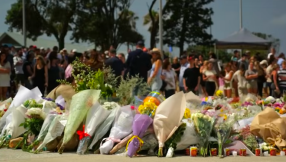How should we respond to a suicide?
In much of the literature on the subject such casualties are known as ‘suicide survivors’, and need not be restricted to close family members and friends, as the trail of devastation caused by his premature death has shown. Fellow players, both past and present, have talked of feeling numb, while shell-shocked supporters have left scarves, football shirts and flowers across several football stadiums stretching from Newcastle and Leeds in the north to Cardiff in the south.
Time alone will tell how well his family and close friends will deal with the consequences of his yet-unexplained action. They are in for a testing time, for according to the American Psychiatric Association “the level of stress resulting from the suicide of a loved one is ranked as catastrophic – equivalent to that of a concentration camp experience”.
It’s at times like this that the church needs to recognise its role as a healing community. Every suicide (and there are approximately one million every year) is a reminder that we live in a fallen world, a world that needs to know that there is a God who cares, and a God that can offer hope in the most terrible of circumstances.
It might sound glib to say we can pray and send messages of condolence. It might prove embarrassing to admit that our words seem inadequate, but even this simple admission can communicate care in the most powerful of ways. I can recall one father telling me at his son’s funeral that he had always avoided contact with people that had been bereaved because he would have not known what to say to them. But in his time of grief he had discovered that “we don’t have to say anything”. Simplistic answers offer no help at all; this father had discovered that he had gained most from those who had done nothing more than sit and weep with him.
Moments such as these also provide us with countless opportunities to talk about the God in whom we trust and the hope that we now possess. The cross, for example, reminds us that it is glib to assume that everyone and anyone will rest in peace. Gary Speed seems to have had a remarkable impact on all who knew him. I have yet to hear a word of criticism or any disparaging comment from friend or colleague. And it is obvious that the spontaneous deluge of praise has been prompted by a life that impacted countless people for good. We should give thanks for that; every good memory is a reminder that he was created in the image of a loving, caring God.
But offensive as it might sound to some the Scriptures tell us that we will only rest in peace if we fall asleep in Christ. We do not know if Gary Speed had a faith in Christ but we can be sure that Christ welcomes those who turn to him even at the moment of death. Good Friday assures of that. But it does more than that for, rather than confirm God’s absence, the cross assures us that He can make himself known in and through the sufferings of this world.
No one understood that better than the German theologian Jurgen Moltmann. Moltmann’s world was shattered when he was captured and held as a prisoner of war between 1945 and 1948. Like so many others, both then and since, Moltmann was almost overcome by feelings of despair and hopelessness. But thankfully, he was given a Bible, and in it he encountered the God-forsaken and crucified Jesus. Paradoxically this experience gave rise to a sense of hope “when in human terms there was little enough to hope for. I summoned up the courage to live at a point when one would perhaps willingly have put an end to it all” (Quoted by Al Hsu in ‘Grieving a Suicide’ IVP).
Suffering, then, can drive us to despair. It can also entice us into the arms of a loving and ever-faithful God. Hosea understood this which is why he was able to outline God’s intentions for his people in these wonderful words
14-15 "And now, here's what I'm going to do:
I'm going to start all over again.
I'm taking her back out into the wilderness
where we had our first date, and I'll court her.
I'll give her bouquets of roses.
I'll turn Heartbreak Valley into Acres of Hope
(Hosea 2:14-15 The Message)
Perhaps this is a good time to pray that the valleys of Wales will once again ring with the sound of hope, as their people discover the reality of 'The Living God’ yet again.
Rob James is Executive Chair of the Evangelical Alliance Wales and Pastor of Westgate Evangelical Chapel













